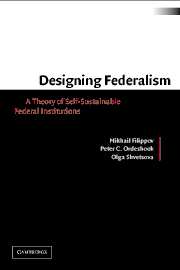Book contents
- Frontmatter
- Contents
- List of Figures
- List of Tables
- Preface
- Acknowledgments
- 1 Federations and the Theoretical Problem
- 2 Federal Bargaining
- 3 Two Cases of Uninstitutionalized Bargaining
- 4 Representation
- 5 Incentives
- 6 Political Parties in a Federal State
- 7 Institutional Sources of Federal Stability I
- 8 Institutional Sources of Federal Stability II
- 9 Designing Federalism
- References
- Name Index
- Subject Index
9 - Designing Federalism
Published online by Cambridge University Press: 03 December 2009
- Frontmatter
- Contents
- List of Figures
- List of Tables
- Preface
- Acknowledgments
- 1 Federations and the Theoretical Problem
- 2 Federal Bargaining
- 3 Two Cases of Uninstitutionalized Bargaining
- 4 Representation
- 5 Incentives
- 6 Political Parties in a Federal State
- 7 Institutional Sources of Federal Stability I
- 8 Institutional Sources of Federal Stability II
- 9 Designing Federalism
- References
- Name Index
- Subject Index
Summary
We thought that the utmost which the discontented colonists could do was disturb authority; we never dreamt that they could of themselves supply it, knowing in general what an operose business it is to establish a government absolutely new.
Edmund Burke as cited in Beer 1993: 205The citizens of Europe are entitled to expect two things that their governments have thus far denied them. The first is a vigorous debate, starting from first principles and with the widest possible participation, about what the future of the European Union should be. The second is an intelligible account, capable of commanding popular agreement, of the rules by which the future of the Union will be shaped. The right way to meet both needs is to discuss and then frame a written constitution for the EU.
Economist, October 28, 2000, p. 11And as to those mortal feuds, which in certain conjunctures, spread a conflagration through a whole nation … proceeding either from weighty causes of discontent given by government, or from the contagion of some violent popular paroxysm, they do not fall within the ordinary rules of calculation. When they happen, they commonly amount to revolutions and dismemberments of empire. No form of government can always either avoid or controul them. It is in vain to hope to guard against events too mighty for human foresight and precaution, and it would be idle to object to a government because it could not perform impossibilities.
Hamilton, Federalist 16- Type
- Chapter
- Information
- Designing FederalismA Theory of Self-Sustainable Federal Institutions, pp. 299 - 336Publisher: Cambridge University PressPrint publication year: 2004



